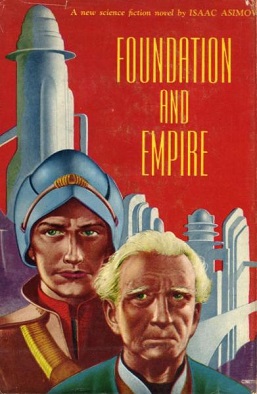Isaac Asimov’s Foundation novels were among the first grown-up science fiction I read. I still remember picking up the tattered dime-store paperback copy of Foundation in the high school library, opening it up, and getting sucked into the story of a galaxy-spanning Empire that was about to collapse from its own cultural-historical inertia, and a rogue colony of “psycho-historians” who use a sort of historical physics to guide the galaxy through the coming dark age to a Second Empire even better and more stable than the first one.
Word on the Web is that HBO is planning a television adaptation of the Foundation series, and I am totally excited. But it’s going to be very interesting to see how this adaptation proceeds. For one thing, the first stories in the series date back to the early 1940s, so their ideas about “futuristic” technology need some serious updating. The first novel, Foundation, implies that it’s possible to have faster-than-light travel and interstellar war without understanding nuclear fission.
For another thing, the first stories in the series date back to the early 1940s, so very nearly every character who does anything meaningful in them is a man. (There is one story, in the later books, that revolves around a precocious teenage girl, and another that centers on a husband-and-wife couple.) But this, it has occurred to me, is not a problem! The Foundation novels are fundamentally not about interpersonal interactions—their recurring theme is that people are swept along in broad historical currents. The story, and its drama, is literally about the Fall and Rise of Empires, not about individual people. So it actually doesn’t matter what gender anyone in the Foundation stories is. As a bonus, everyone’s names are in Asimov’s concept of future-ese, which makes many of them less obviously gendered: Hari Seldon, Salvor Hardin, Bel Riose. Those are all dudes in the original, but don’t tell me they couldn’t each be women.
So my challenge to the folks working on this adaptation: Gender-swap every other character that you adapt from the original Foundation books. You’ll end up with a more human vision of the future, and you might just end up creating the next Starbuck — or several of them — in the process.

